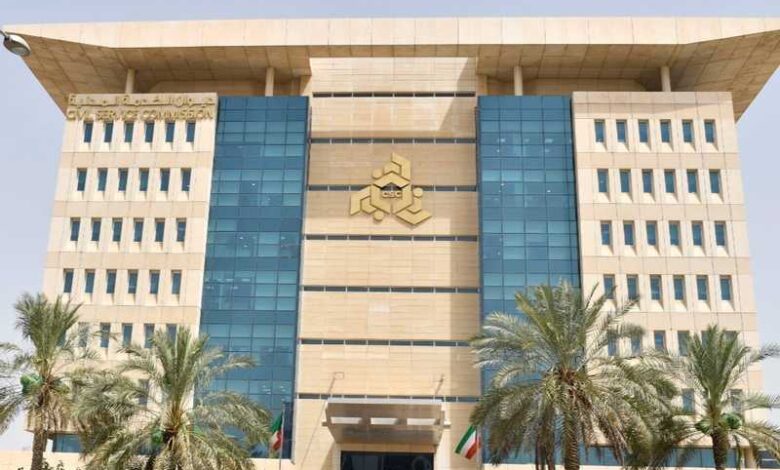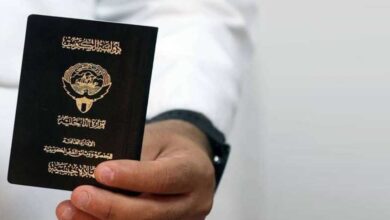“Civil Service Bureau” declares no residency job renewals after March 31

According to sources from Al-Jarida, the Civil Service Bureau is currently considering the possibility of removing the third fingerprint requirement during official working hours in Ramadan to ease the workload on employees and account for time constraints.
However, the Bureau has confirmed that it will continue enforcing the replacement policy across all government agencies. As a result, any resident holding a non-rare government position will not have their contract renewed after March 31. It’s also important to note that this policy does not apply to the children of Kuwaiti women.
In a statement shared through its account on the “X” platform, the Civil Service Bureau clarified that the replacement policy is being enforced in accordance with Civil Service Council Resolution No. 11 of 2017.
The Bureau highlighted that a significant number of non-Kuwaitis have had their services terminated since the policy’s implementation. It also noted that the remaining small percentage of non-Kuwaitis had their contracts renewed only at the request of government agencies, with the renewal valid until March 31. This temporary extension aims to allow time for the qualification of Kuwaiti nationals to fill vacancies in these government positions.
Regarding the present fingerprint system, sources revealed that the Civil Service Bureau is considering submitting a proposal to temporarily suspend it during the holy month of Ramadan to the Civil Service Council. The Bureau aims to ease the burden on employees, taking into account the shorter working hours, which typically range from 4 to 5 hours during Ramadan. The final decision will rest with the Civil Service Council.
About the evening shift, sources explained that some government agencies have yet to respond about identifying employees to work during this shift. Additionally, there are still concerns regarding the financial allowances allocated for the morning shift, which are preventing some employees from being willing to take on the evening shift.
Additionally, the Ministry of Electricity, Water, and Renewable Energy has contacted the Civil Service Bureau to clarify the nature of the comprehensive salary referenced in the Bureau’s decisions concerning the re-employment of women whose nationalities were revoked.
Sources from the Electricity Ministry stated that there is some ambiguity surrounding the definition of the comprehensive salary and whether it includes amounts allocated for insurance or if such amounts are deducted from it. This is particularly relevant since individuals whose nationalities have been withdrawn are not subject to the insurance system.
The sources further pointed out that the new contracts are currently being signed for this category, with the number of female employees in the ministry exceeding 100. The aim is to amend their status in accordance with the stipulations outlined in the relevant decisions.
In the details of the news:
The Civil Service Bureau confirmed that it will continue to implement the replacement policy across all government agencies, noting that this policy does not apply to the children of Kuwaiti women.
The Bureau stated, through its account on the “X” platform, that the implementation of this policy is in accordance with Civil Service Council Resolution No. 11 of 2017.
Moreover, the Bureau added that it has been closely monitoring the implementation of the replacement policy across all government agencies, ensuring that each job group is filled according to the specified percentages. It also emphasized the recruitment of national cadres through the appointment mechanism, which involves registration in the central employment plan.
The Bureau explained that since the implementation of the replacement policy, the services of many non-Kuwaiti employees, except for the children of Kuwaiti women, have been terminated. It noted that a small percentage of these employees have had their contracts renewed at the request of government agencies, but only until March 31, 2025. After that date, no renewals will be made for any non-Kuwaiti employee holding a non-rare job. The Bureau also stressed that the replacement policy does not apply to the children of Kuwaiti women.
Presence footprint
Al Jarida has learned from its sources that the Civil Service Bureau is considering the possibility of suspending the present fingerprint (the third fingerprint) during official working hours in the month of Ramadan. The Bureau plans to submit this proposal to the Civil Service Council, which has the final say. The proposal aims to temporarily suspend Article 10 bis of Resolution No. 6 of 2024, which amended Civil Service Council Resolution No. 41 of 2006, concerning the rules and regulations governing official work during the holy month.
The sources highlighted that the Civil Service Bureau’s proposal is driven by the goal of easing the burden on employees during the holy month of Ramadan, in addition to the already shortened working hours, which typically range from 4 to 5 hours.
Regarding evening shifts, the sources noted that some government agencies have yet to respond about assigning employees to work in the evening. They also mentioned ongoing concerns about the financial allowances for morning shifts, which are causing some employees to hesitate in accepting evening shifts.
It is important to note that Article 10 bis of Resolution No. 6 of 2024 stipulates that, without prejudice to the leave regulations and prescribed grace period, proof of an employee’s attendance, departure, and presence at the workplace during official working hours shall be through facial recognition. The entity may also incorporate additional electronic methods into the fingerprint systems, alongside facial recognition, as deemed beneficial for the work process.
The employee is required to confirm their presence at the workplace during official working hours by providing a fingerprint scan within sixty minutes after the completion of two hours from the start of their shift. However, if the employee is on leave, any part of which overlaps with the 60-minute period, they are not obligated to provide the fingerprint scan.
If an employee fails to prove their presence within the specified 60 minutes, as outlined in the previous paragraph, they will be considered to have left during official working hours without permission.
If an employee fails to prove their presence within the specified 60 minutes, as outlined in the previous paragraph, they will be considered to have left during official working hours without permission. In this case, the period from two hours after their scheduled shift until the time they prove their presence via fingerprint will be counted as part of their monthly delay periods, as per Article 18 of this resolution. The Civil Service Bureau may also establish additional time frames for employees to conduct their fingerprint verification to prove their presence, based on work circumstances and requirements.
It is important to note that this decision aligns with the Cabinet’s directive during its meeting on July 2, which tasked the Civil Service Bureau with taking the necessary actions to ensure that employees remain at the workplace during official working hours. This includes verifying attendance and departure through facial recognition systems and other electronic methods to effectively monitor employee presence, while also respecting the established systems for leave and permissions.












